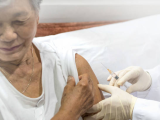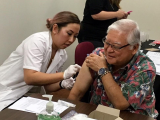Dec 21, 2012 (CIDRAP News) – The World Health Organization (WHO) says its recent investigation of illnesses associated with two confirmed novel coronavirus (CoV) infections in Jordan suggests that some cases can be relatively mild and that investigators are now more suspicious that the cluster involved person-to-person transmission.
On Nov 30 the WHO announced that the novel virus had been confirmed retrospectively in two fatal illnesses that were part of a hospital cluster of respiratory infections in Jordan in April. That report increased the number of confirmed novel CoV cases to nine, including five deaths. Besides the Jordanian cases, Saudi Arabia has had five cases and Qatar has had two. All the patients were severely ill.
WHO experts went to Jordan at the government's invitation in November to investigate the hospital cluster, the agency said in a statement today. The team visited the hospital; interviewed patients, relatives, and caregivers; and reviewed case files.
In particular, the investigators looked at a number of healthcare workers who had had pneumonia associated with the confirmed novel CoV cases. Their illnesses are now considered probable cases, the WHO said.
"All patients had significant respiratory disease presenting as pneumonia," the agency said. "Disease was generally milder in the unconfirmed probable cases. One patient who is a probable case had symptoms that were mild enough to be managed at home and was not admitted to hospital."
Although all the confirmed novel CoV cases have been severe, the WHO said, "The additional unconfirmed probable cases in Jordan indicate that milder presentations may also be a part of the clinical appearance associated with infection."
The WHO didn't say exactly how many illnesses were in the Jordan cluster. Back in May, months before the novel CoV was discovered, a report from the European Centre for Disease Prevention and Control said the cluster involved 11 people, including eight healthcare workers, in a hospital intensive care unit.
Investigators couldn't identify either the index case or the route of exposure in the Jordan cluster, today's WHO statement said. Most family members and healthcare workers who had close contact with the confirmed and probable case-patients didn't experience any respiratory illness.
"However, the appearance of pneumonia in some who provided care in at least two family members with direct personal contact increases the suspicion that person-to-person transmission may have occurred," the WHO said.
The Jordan cluster is not the first one associated with the novel CoV. Three of the cases confirmed earlier in Saudi Arabian were in the same family and household, and a fourth member of the family recovered from a similar illness but tested negative for the virus.
Still, from what is now known, the virus does not appear to spread easily or sustainably from person to person, unlike its relative the SARS [severe acute respiratory syndrome] virus, the WHO said today, reiterating previous comments. The SARS virus spread to dozens of countries in 2003, causing about 8,000 illnesses and killing more than 900 people.
The Jordanian patients had no history of travel or contact with animals, the investigation revealed. In at least two of the previous confirmed cases, patients had had some degree of contact with farm animals. And a study published last week suggested that the novel CoV may be able to infect a variety of animal species, including bats, pigs, and primates.
The WHO said investigators have not excluded the possibility that the Jordan patients caught the virus through exposure to a common source. "Further investigation with serological testing (when it becomes available) to confirm additional cases may help determine the types of exposures that result in infection."
The WHO team found some other things that didn't match the pattern of the nine confirmed cases. One is that none of the patients in the cluster suffered renal failure, which occurred in 5 of the 9 confirmed cases.
In addition, one of the patients who had a confirmed case and died was found to have pericarditis (inflammation of the heart lining). And the other patient who died with a confirmed case had disseminated intravascular blood coagulation as a complication of his or her severe respiratory disease.
The WHO said investigators are continuing to try to determine the source of infection and the route of exposure in the identified cases.
The agency repeated its previous recommendation that healthcare providers should consider testing for the novel CoV in patients with unexplained pneumonia, especially if they have been in Arabian peninsula countries or neighboring lands.
Also repeated was the recommendation that any clusters of severe acute respiratory illnesses in healthcare workers should be thoroughly investigated, regardless of location.
The WHO does not recommend screening people at points of entry, nor does it recommend any travel or trade restrictions because of the novel virus.
See also:
Dec 21 WHO statement
Nov 30 CIDRAP News story "Two Jordan cases in April shift novel coronavirus picture"
Dec 11 CIDRAP News story "New coronavirus can infect cells from multiple species"


















